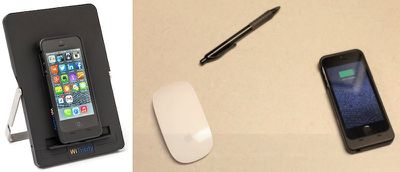CES 2014: WiTricity Announces New Wireless Charging System Design for iPhone 5/5s
Wireless power firm WiTricity today announced the release of a reference design for its new wireless charging system aimed at the iPhone 5 and iPhone 5s. Moving beyond existing induction power transfer technologies such as Powermat that require direct contact with a charging pad, WiTricity's system supports power transfer over short distances using magnetic resonance, allowing charging pads to be kept out of sight such as mounted on the bottom surface of a desk.

The WiTricity charging system for the iPhone 5/5s includes a wireless charging hub and a charging sleeve that fits an iPhone 5 or 5s. Similar to other protective covers, the WiTricity sleeve quickly slides onto an iPhone 5/5s and is powered when in proximity to the WiTricity charging hub. Capable of charging two phones concurrently, the charging hub can be placed on top of a table as an upright or flat charging pad, or mounted underneath a table or desk for charging through the surface. By mounting the charging pad under a surface, smartphone users are freed from the tangle of charging cords and cluttered desktops.
We first explored Apple's connection to WiTricity in
July 2011 after it was reported that Apple was working on a "new way of charging" the iPhone, and while that way turned out to simply be the Lightning connector introduced in the iPhone 5, Apple does clearly have an interest in wireless charging and WiTricity's technology in particular.
Patent applications from Apple have outlined how the company could use something in line with WiTricity's technology to allow a computer such as an iMac to serve as a wireless charging hub, with accessories and other devices such as keyboard, mice, and iOS devices able to be charged simply by being in close proximity to the iMac. Shortly after the publication of a key Apple patent application on the concept, WiTricity even demoed how such a system would work.
WiTricity's system announced today is a reference design not meant for direct sale to consumers, but it will allow the company to partner with a variety of other firms such as device manufacturers, accessory companies, and furniture makers to explore implementation of the technology.
Popular Stories
Since the iPhone X in 2017, all of Apple's highest-end iPhone models have featured either stainless steel or titanium frames, but it has now been rumored that this design decision will be coming to an end with the iPhone 17 Pro models later this year.
In a post on Chinese social media platform Weibo today, the account Instant Digital said that the iPhone 17 Pro models will have an aluminum...
Apple is continuing to refine and update iOS 26, and beta three features smaller changes than we saw in beta 2, plus further tweaks to the Liquid Glass design. Apple is gearing up for the next phase of beta testing, and the company has promised that a public beta is set to come out in July.
Transparency
In some apps like Apple Music, Podcasts, and the App Store, Apple has toned down the...
In select U.S. states, residents can add their driver's license or state ID to the Wallet app on the iPhone and Apple Watch, providing a convenient and contactless way to display proof of identity or age at select airports and businesses, and in select apps.
Unfortunately, this feature continues to roll out very slowly since it was announced in 2021, with only nine U.S. states, Puerto Rico,...
Apple will launch its new iPhone 17 series in two months, and the iPhone 17 Pro models are expected to get a new design for the rear casing and the camera area. But more significant changes to the lineup are not expected until next year, when the iPhone 18 models arrive.
If you're thinking of trading in your iPhone for this year's latest, consider the following features rumored to be coming...
Apple is expanding the ability to add an Apple Account Card to the Wallet app to more countries, according to backend Apple Pay changes.
With iOS 15.5, Apple updated the Wallet app to allow users to add an Apple Account Card, which displays the Apple credit balance associated with an Apple ID.
If you receive an Apple gift card, for example, it is added to an Apple Account that is also...
Three out of four iPhone 17 models will feature more RAM than the equivalent iPhone 16 models, according to a new leak that aligns with previous rumors.
The all-new iPhone 17 Air, the iPhone 17 Pro, and the iPhone 17 Pro Max will each be equipped with 12GB of RAM, according to Fixed Focus Digital, an account with more than two million followers on Chinese social media platform Weibo. The...
Apple should unveil the iPhone 17 series in September, and there might be one bigger difference between the Pro and Pro Max models this year.
As always, the Pro Max model will be larger than the Pro model:iPhone 17 Pro: 6.3-inch display
iPhone 17 Pro Max: 6.9-inch displayGiven the Pro Max is physically larger than the Pro, it has more internal space, allowing for a larger battery and...
The calendar has turned to July, meaning that 2025 is now more than half over. And while the summer months are often quiet for Apple, the company still has more than a dozen products coming later this year, according to rumors.
Below, we have outlined at least 15 new Apple products that are expected to launch later this year, along with key rumored features for each.
iPhone 17 Series
iPho...




















